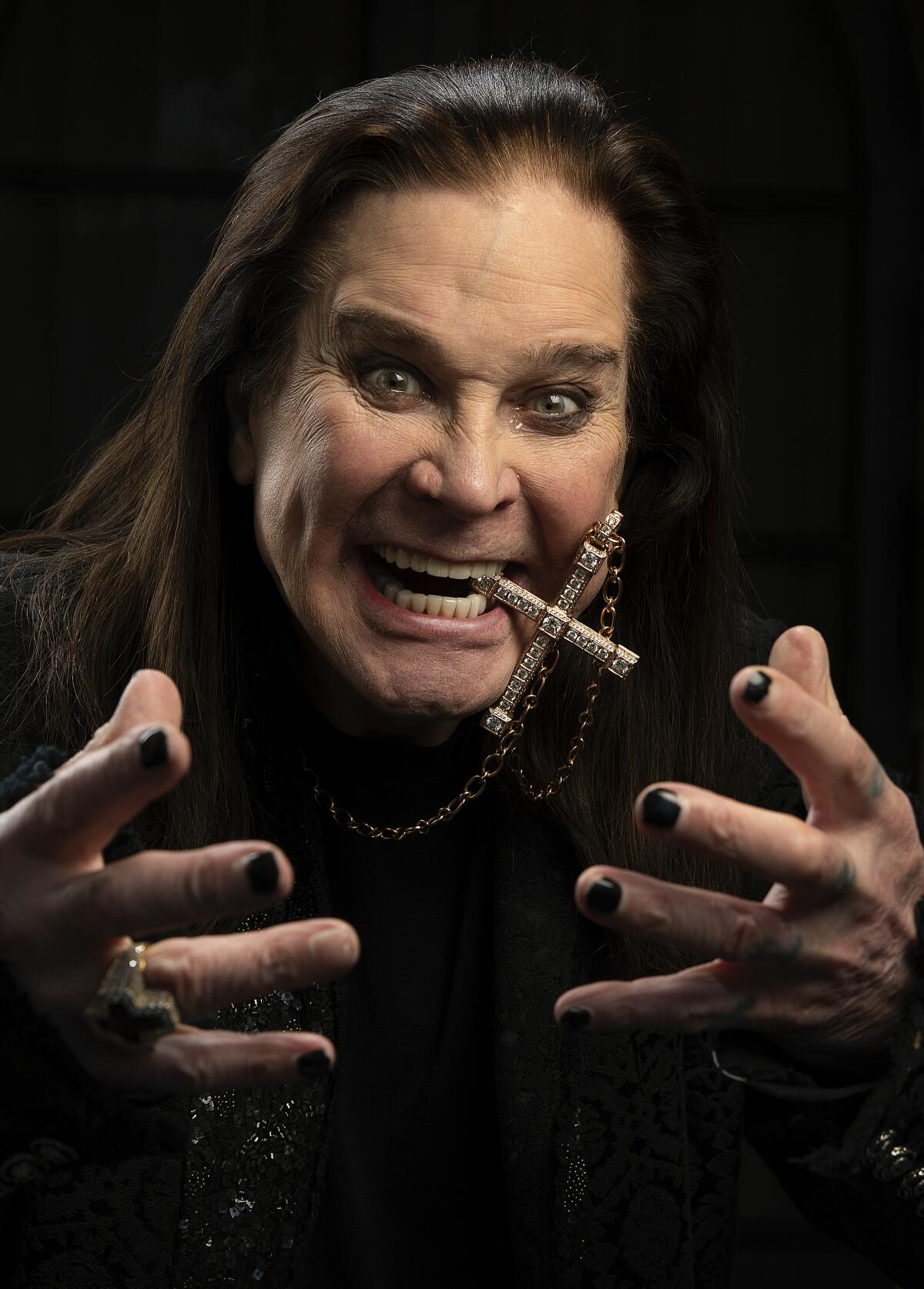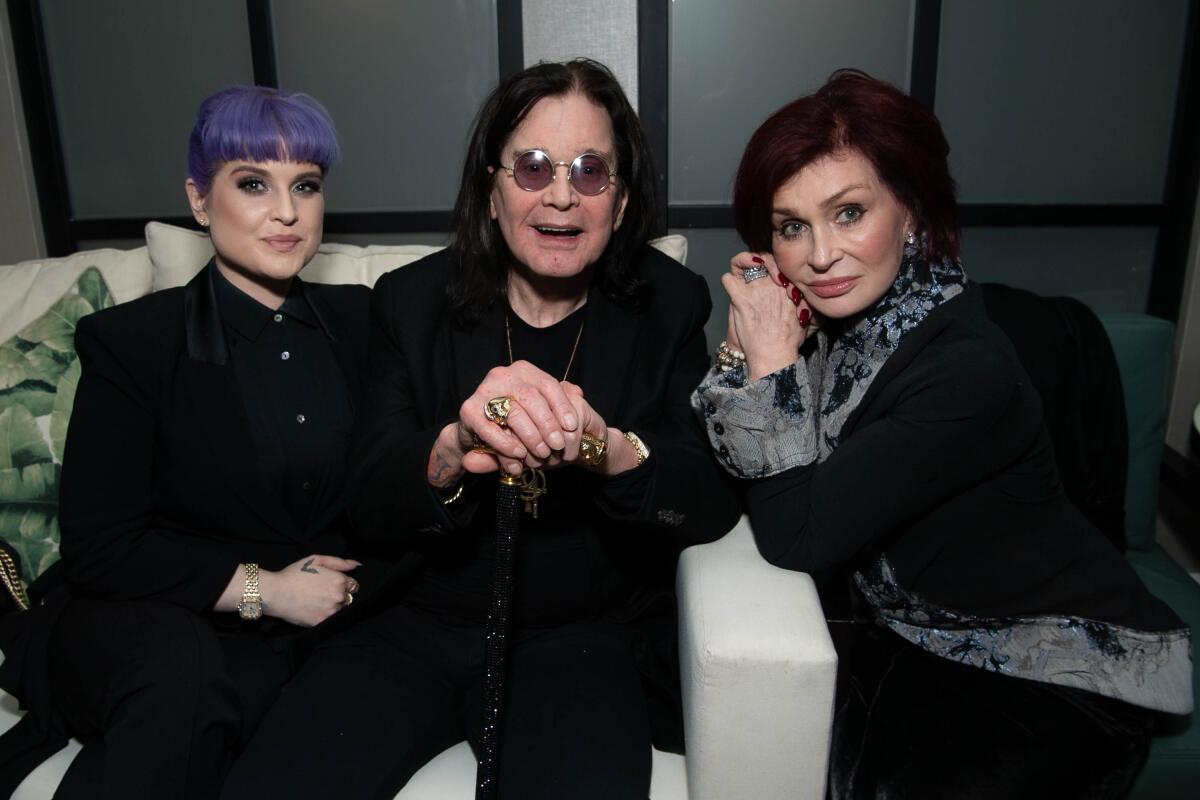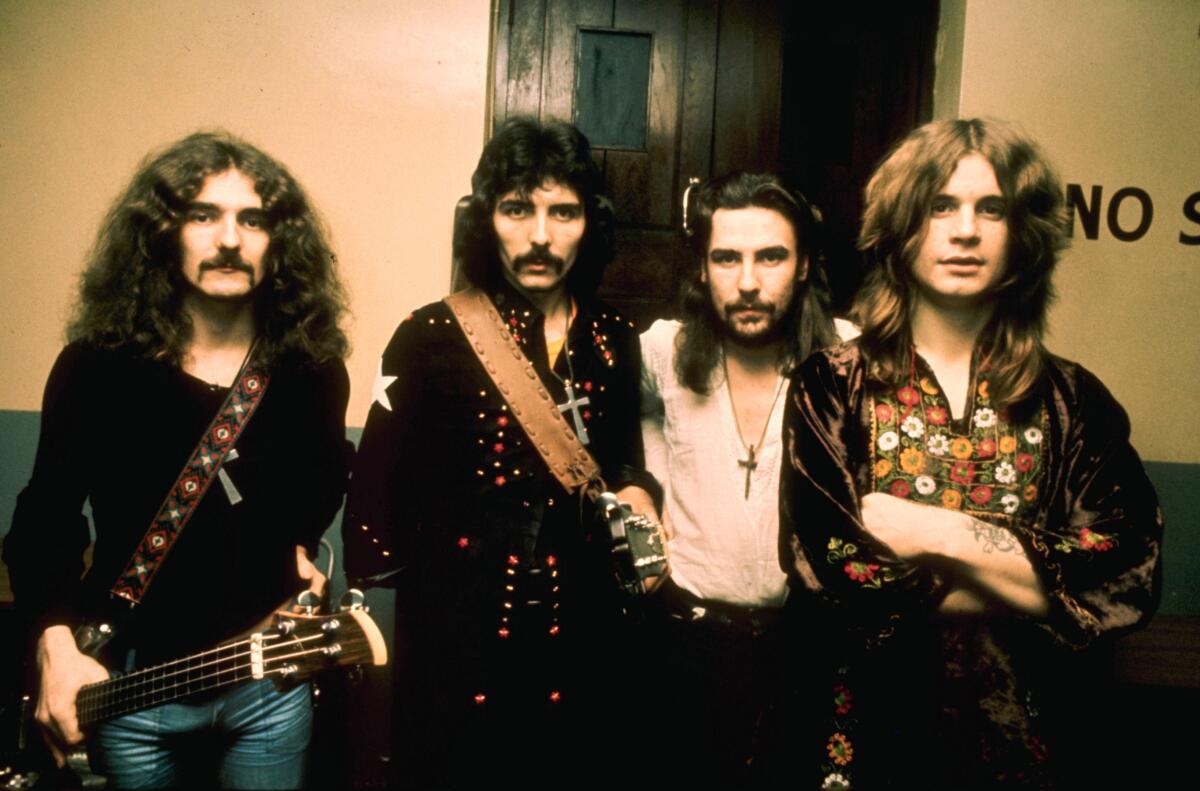What doesn’t kill Ozzy Osbourne makes him ... even Ozzier

On a quiet afternoon in the home of Ozzy Osbourne, the Prince of Darkness steps gently into his parlor. He wears blue velvet loafers and a belt buckle of tiny skulls made of diamonds and gold. By his side is a small dog he calls Snotty.
As the heavy metal icon takes a seat by his fireplace in Hancock Park, he’s as welcoming and scattered as ever, but there’s a stiffness to his walk, the lingering effects of a late-night fall last year and subsequent spinal surgery. Physical therapy helps, and Osbourne estimates he’s about 75 percent back to normal.
“I can’t really complain,” says Osbourne, 71, whose life and career were once partly defined by extreme behavior and close calls.

In January, Ozzy and wife Sharon Osbourne appeared on “Good Morning America” and revealed he had Parkinson’s disease, though he says now it was first diagnosed back in 2003.
“I’m not dying from Parkinson’s. I’ve been working with it most of my life,” says the singer, who noted the medication he takes for tremors can cause short-term memory loss. “I’ve cheated death so many times. If tomorrow you read ‘Ozzy Osbourne never woke up this morning,’ you wouldn’t go, ‘Oh, my God!’ You’d go, ‘Well, it finally caught up with him.’”
Born John Michael Osbourne in 1948, the singer has seen outsized fame as a wild-eyed showman behind the microphone and elsewhere, singing playfully creepy hit songs (“Crazy Train,” “Mr. Crowley”), or infamously biting the head off a dove during a meeting at CBS Records in 1981, followed by another off a bat tossed onstage in Des Moines, Iowa, in 1982.

That was before he became a loving, shouting and befuddled reality TV dad — standing beside wife and manager Sharon Osbourne and kids Kelly and Jack. (Their sister Aimee declined to participate.) Or being inducted into the Rock and Roll Hall of Fame in 2006 as a member of Black Sabbath, which created an entire genre of Gothic metal that was a core influence on the generations of loud noises that followed, from Metallica to Nirvana.
The singer is aiming to resume the solo farewell tour interrupted by his accident and get beyond this long season of physical challenges: the fall at home, a bout with pneumonia, ongoing complications from a 2003 neck injury, plus the diagnosis of Parkinson’s disease.
Among the shows postponed in 2019 was a night at the Hollywood Bowl, recently rescheduled for July 27.
“It’s been a pretty incredible, interesting career,” he notes cheerfully of a life that lifted him out of anonymity in Birmingham, England. “People have written me off time and time again, but I kept coming back and I’m going to come back from this.
“When? I don’t know,” he says. About performing, he adds, “I don’t want to go back out there until I’m ready.”
At the same time, Osbourne has been active again as a recording artist, with a Top 10 single (with Post Malone and Travis Scott) last fall in “Take What You Want,” and the coming Feb. 21 release of his first new solo album in a decade, “Ordinary Man.” He’s already planning the next one.

This unexpected creative rebirth came when Osbourne was at his lowest point, convalescing at home, bedridden much of the time. Walking was difficult and he rarely left the house. Then he got an invitation last year to appear on a song with chart-topping rapper Post Malone.
“My response to that was, who is Post Malone?” he recalls. “What kind of a name is that?”
The producer was Andrew Watt, 29, a frequent collaborator with Malone, Juice Wrld, Lana Del Rey and Justin Bieber. Much of his pop and hip-hop work is far removed from Osbourne’s hard rock, but Watt grew up listening to Black Sabbath with his father and never lost his classic-rock obsessions.
Watt produced “Take What You Want” for Malone’s smash album “Hollywood’s Bleeding” and played a tapping guitar solo over the song’s smoky hip-hop production. He and Osbourne hit it off.
“It got me out of my misery,” Osbourne says now of the recording session. “It saved my life.”
Osbourne asked Watt to produce a full album for him, and the guitarist-producer quickly lined up Red Hot Chili Peppers drummer Chad Smith and bassist Duff McKagan of Guns N’ Roses for the project. The three musicians then dove in and wrote and recorded all the music for the album in four days.
“I got those guys over to the house the next day and we made an album’s worth of music in a blur. Everyone was on fire,” Watt recalled.
“I was coming up with a song a day,” says Osbourne, noting that on past albums, the creative process was often drawn out, jamming with his band and sketching out ideas. “Normally, we would go, ‘Let’s just live with this track for a few hours,’ which ended up being days, which ended up being weeks. This was just bang, bang, bang.”
The first song written was the title track, as Osbourne wrote out wistful, autobiographical lyrics: “Yes, I’ve been a bad guy / Been higher than the blue sky / I’ve made momma cry / Don’t know why I’m still alive.”
As the recording progressed, the shape of the ballad reminded the singer of classic Elton John hits from the 1970s. That feeling was encouraged by Sharon, a close friend to John, and soon Watt was on a plane to Atlanta to record the superstar on piano and support vocals. Slash also provided an epic-sized guitar solo.
“It’s just like a rock ’n’ roll moment between Ozzy and Elton, singing about mortality and the legacy behind that,” said Watt, who then flew to Abbey Road Studios in London to add the London Philharmonic and a choir for the same song. “It’s just beautiful.”
“He’s my mate,” Ozzy says of Elton, “but Sharon and him get on like a house on fire. They’re phoning each other all the time.”

The track “Under the Graveyard” is a growling horror story, with an accompanying music video that depicts young Ozzy at rock bottom, post-Sabbath and adrift amid drink, drugs and dangerous thrills, before Sharon rescues him. It’s a depiction Osbourne doesn’t fully endorse, but it suggests a vivid rock ’n’ roll tale to be told, particularly now that successful, Oscar-winning films have been made about Queen and Elton John.
“If anyone has lived the debauched rock ’n’ roll lifestyle,” Osbourne admits, “I suppose it’s me.” (Osbourne says he’s been sober for seven years.)
As for an Ozzy movie, he acknowledges “one in the pipeline. Don’t ask me anything about it. My family are involved and I said to my wife, good luck. To get my three kids to agree on one thing, you’ve got to get up really early in the morning.”
It’s not a new idea, as Sharon has been pushing for an Ozzy film for two decades, she says, long before the current wave of rock biopics.
“People thought I was insane trying to get a movie done on Ozzy,” she says. Interest in the story has predictably exploded, as filmmakers, writers and producers look to grab a share of “Bohemian Rhapsody”-like success. Sharon is unimpressed with most of the proposals, including movie treatments based entirely on news clippings and no genuine insight on the Osbournes’ personal lives.

There have been extreme highs and lows, from raising their three children and creating the touring festival Ozzfest, to dealing with Osbourne’s addictions. As Ozzy’s career continued, Sharon established a role independent of her husband she currently cohosts CBS’ “The Talk.” Kelly, 35, is a TV personality on both sides of the Atlantic, while Jack, 34, works largely behind the scenes as a producer. There was also Ozzy’s 2016 affair with his hair colorist, which nearly ended his marriage. Ozzy underwent therapy for sex addiction. Sharon eventually took him back.
“Our story is a love story and it happens that he’s a musician,” Sharon said of the family’s movie proposal. “We’re working in our own quiet way, doing our own thing on that. It’s totally different to what anybody would think.”
The bookshelves around Ozzy are filled with various mementos and obsessions. There are books on the Beatles, Sinatra and punk rock, framed photographs of family members and beloved dogs, and a row of Grammy awards.
Nearby rests an Emmy for reality program for 2001-02, from his time as a high-strung TV patriarch on MTV’s “The Osbournes.” A new audience discovered him there, watching scenes of shouting and the otherwise chaotic home life of a heavy metal star.
“My wife’s been special,” Osbourne says. “Thirty-eight years we’ve been married this year. I nearly lost her a few times. But you learn by your mistakes.
“We stuck together and it’s good. I’m dying to find the person who wrote: ‘And they all lived happily ever after,’ because it’s a lie. But it’s also a pretty boring existence ... ‘happily ever after.’”
More to Read
The biggest entertainment stories
Get our big stories about Hollywood, film, television, music, arts, culture and more right in your inbox as soon as they publish.
You may occasionally receive promotional content from the Los Angeles Times.










